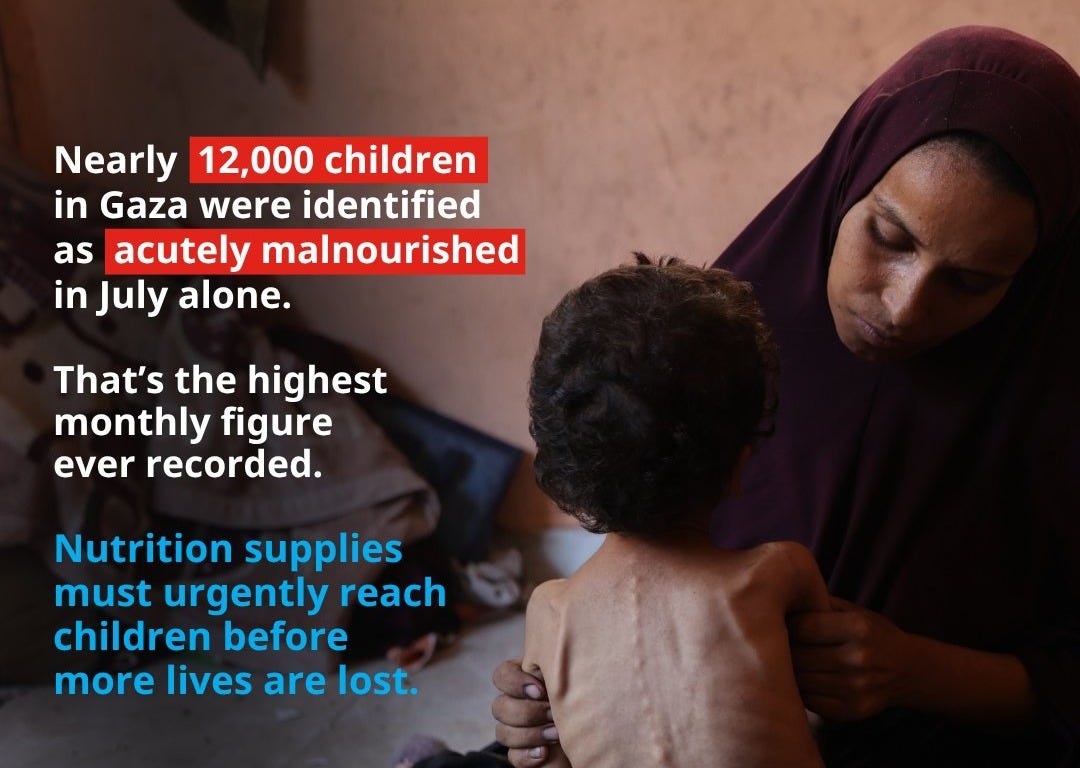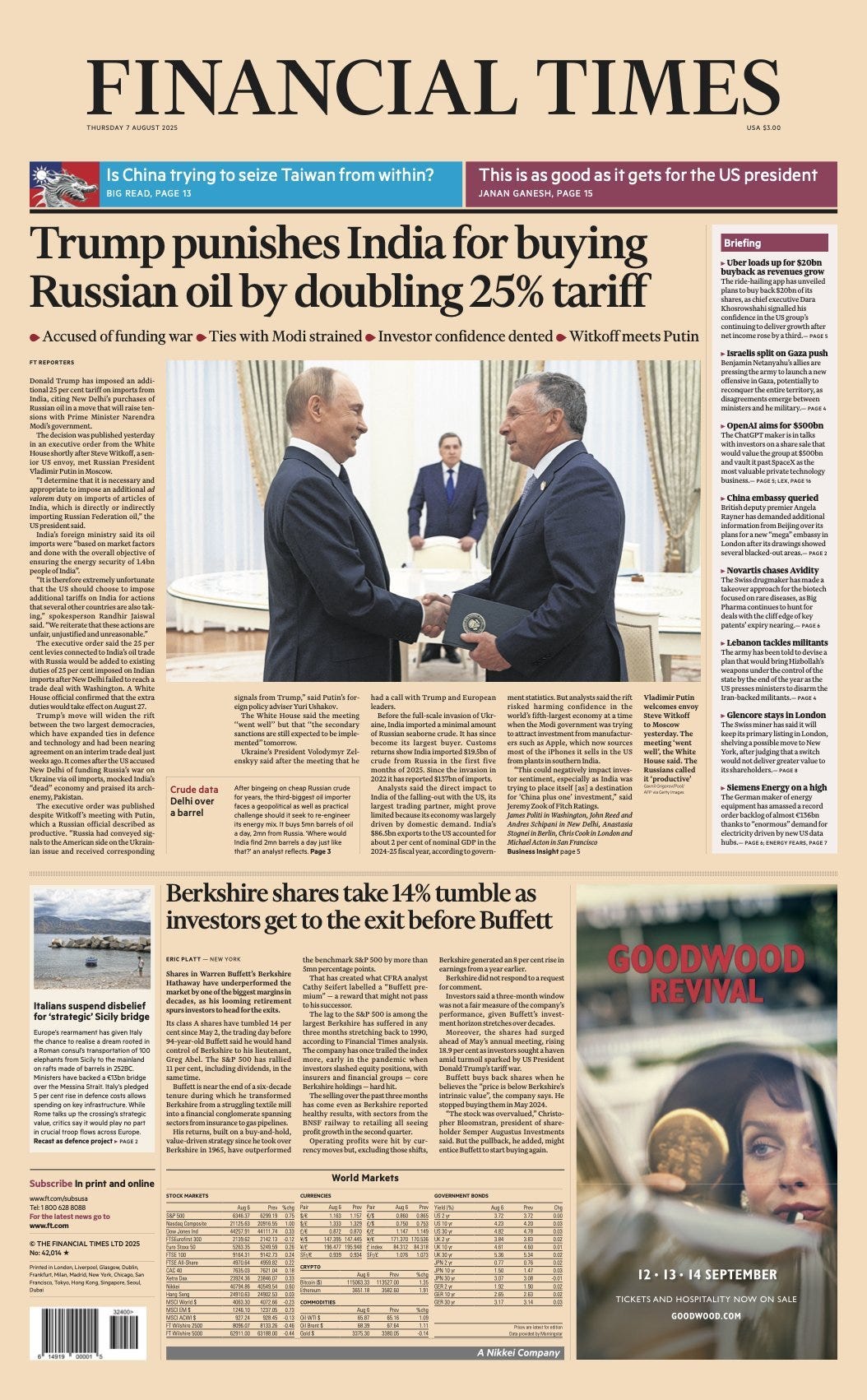🔥 War Games on Two Fronts: Trump Eyes Peace Prize, Netanyahu Eyes All of Gaza
While Trump angles for a Nobel via a risky Putin summit, Netanyahu vows to seize Gaza—ignoring hostage risks & amid record malnutrition. Two leaders, two theatres, one dangerous week for diplomacy
Prime Minister Benjamin Netanyahu said on Thursday that Israel planned to take control of all of Gaza, bucking the advice of the Israeli military and warnings that expanding operations could endanger the hostages being held there and kill more Palestinian civilians. Mr. Netanyahu made the comments in an interview with Fox News ahead of a security cabinet meeting on Thursday to discuss a proposal to expand military operations in Gaza. They came as talks to achieve a cease-fire and the release of the hostages have hit an impasse, with Israeli and Hamas officials blaming each other for the deadlock. When asked whether Israel would take over all of Gaza, he responded, “We intend to.” Mr. Netanyahu said the move would “assure our security,” remove Hamas from power and enable the transfer of the civilian administration of Gaza to another party. “We want to liberate ourselves and the people of Gaza from the awful terror of Hamas,” he said in an excerpt from the interview, without providing details on any planned operation. The prime minister, however, suggested Israel was not interested in maintaining permanent control over the entire enclave. “We don’t want to keep it,” he added. “We don’t want to govern it. We don’t want to be there as a governing body. We want to hand it over to Arab forces.” In the excerpt published by Fox News, Mr. Netanyahu offered few specifics about his plan. Some analysts have said that he has threatened to widen the offensive to compel Hamas to offer concessions in the cease-fire negotiations. Hamas, in a statement on Thursday responding to Mr. Netanyahu, said his comments “represent a clear reversal of the course of negotiations and clearly reveal the true motives behind his withdrawal from the final round.” Even if the Israeli ministers in the security cabinet vote in favor of seeking to take over the remainder of Gaza, it could be days or weeks before Israeli soldiers begin pushing deeper into the territory - NYT
Gaza has seen its highest monthly figure of acute malnutrition in children, with hunger-related deaths rising in the enclave, the Director General of the World Health Organization reported on Thursday. "In July, nearly 12,000 children under five years were identified as having acute malnutrition in Gaza, the highest monthly figure ever recorded, says director general of world health organization," said Tedros Adhanom Ghebreyesus. There is an upward trend in the number of trucks entering Gaza but it is still below what was agreed between the European Union and Israel under a deal last month on improving humanitarian access, the bloc’s foreign policy and humanitarian arms said in a document seen by Reuters on Thursday. The UN and other partners report that 463 trucks were offloaded at crossing points to Gaza between July 29 and August 4, the document said.
Gaza’s hospitals have recorded four new deaths “due to famine and malnutrition over the past 24 hours”, according to the enclave’s Health Ministry, raising the total number of hunger-related deaths to 197, including 96 children. The UN’s child relief agency (UNICEF) says the number of Palestinian children suffering from acute malnutrition in Gaza has surged from about 2,000 in February to nearly 12,000 now- AJE
Russian President Vladimir Putin said Thursday he hopes to meet next week with U.S. President Donald Trump, possibly in the United Arab Emirates, although a White House official cast doubt on the summit occurring unless the Kremlin leader also agreed to a meeting with Ukrainian President Volodymyr Zelensky Putin’s announcement came on the eve of a White House deadline for Moscow to show progress toward ending the 3-year-old war in Ukraine or suffer additional economic sanctions. The U.S. was still expected to impose those sanctions Friday on Russia, according to a White House official who was not authorized to speak publicly and spoke on condition of anonymity. The same official said a U.S.-Russian summit would not happen if Putin does not agree to meet with Zelensky. The official did not specify whether the condition was for Zelensky to be present at the possible U.S.-Russia summit or at a subsequent meeting. Speaking of possible direct talks with Zelensky, Putin said he has mentioned several times that he was not against it, adding: “It’s a possibility, but certain conditions need to be created” for it to happen. The Kremlin has previously said that Putin and Zelensky should meet only when an agreement negotiated by their delegations is close. Although Putin said the United Arab Emirates was one possible venue, no location or other details had been determined Thursday morning, according to the White House official - AP
Watch my BBC World Television News interview broadcast live Thursday morning at 0600 CET, where I unpack what’s at stake with the reported bilateral - or maybe even trilateral - summit meetings chaired by Donald Trump to end the war in Ukraine.
And here’s an excerpt from my just-published Globe and Mail OpEd. You can read the full version here
Whatever unfolds at a bilateral or trilateral summit, Mr. Trump and his advisers would do well to recall the blunt warning once delivered to Richard Nixon by the respected Italian diplomat and former NATO secretary general Manlio Brosio, who described Russian negotiators as pathological liars. Nixon came to understand that the Russians could be managed – but only when deals served their interests, and only when breaking them carried a clear and painful price.
That’s exactly what Ukraine must demand at any future summit: the U.S. as a credible guarantor of any peace deal. Mr. Putin must leave the table with no room for misinterpretation, knowing that any breach will trigger swift, punishing consequences – not just for Russia, but for its sanction-busting allies as well.
There is no other way.
The junta in Myanmar has launched another brutal page in their crackdown on dissent - using a draconian new cybersecurity law to conduct street phone checks of civilians. Junta patrols by soldiers, militia and traffic police have started checking the phones of pedestrians and motorists in Mandalay, Myanmar’s second largest city, after junta boss Min Aung Hlaing signed the broadly-worded law into effect on July 30. According to locals, these checks go beyond routine vehicle and driving license verification and now include invasive searches of mobile phones for social media usage and Virtual Private Network (VPN) software. “I thought it was just a regular license check, so I stopped my motorbike. Once they saw everything was in order, they inspected my phone. After failing to find VPN software or Facebook on my phone, they accused me of deleting them,” said a 25-year-old man from Maha Aungmyay Township. “Then they started digging through my photos and videos. They wore militia uniforms and were around the same age as me.” The junta passed its repressive Cybersecurity Law on Jan. 1, criminalizing the use of VPNs and penalizing users who access banned sites or share information from them. The law grants the regime unlimited power to access user data, arrest online critics and conduct online surveillance. It also criminalizes online gambling and other banned cyber activities. A digital rights advocate said the law violates fundamental human rights, including freedom of expression, the right to access information, and cyber freedoms, while granting the junta legal cover for its suppression. Since the 2021 coup, the junta has consistently targeted online platforms and social media channels by imposing internet shutdowns and blocking sites like Facebook and independent news websites. To get around this, internet users have turned to VPNs, applications that can bypass such blocks. The junta banned the use of VPNs in May 2024. The Cybersecurity Law extends beyond Myanmar’s borders to vessels or aircraft registered under its laws, and even Myanmar citizens using the internet abroad. Under the law, establishing or providing VPN services without authorization is punishable by up to six months in jail and/or a fine up to 10 million kyats (around US$ 4,750) - The Irrawaddy
Beijing is showing that two can play the national security game. The Cyberspace Administration of China summoned Nvidia to address concerns that its H20 AI chips have backdoors, after a US proposal called for advanced semiconductors sold overseas to have tracking capabilities. The company recently received approval from the Trump administration to export those chips to China, reversing a Biden-era ban that cost Jensen Huang’s company billions in sales. Huang also just concluded a public visit to China in which he was greeted like a rock star, bucking other Big Tech CEOs who have avoided the spotlight when it comes to Beijing. Separately, sabotaging supply chains is just one of several options Chinese scientists have come up with to thwart Elon Musk’s system of Starlink satellites, which are seen as a tool that could be used against China in a conflict, the Associated Press reported. But the civilian use of the technology could ultimately pose an even bigger threat to Beijing and other countries that tightly control access to the internet. Today, Starlink satellites require fairly noticeable dishes pointing at the sky in order to achieve high bandwidth connections. But telecommunications companies are researching ways to achieve satellite connections without the use of GPS, which is necessary today. Within the next several years, it may be possible to get satellite internet on cell phones, even indoors. In that world, the only way to cut off the internet may be to take out satellites — which would mean targeting Musk’s products, even though the entrepreneur has also had more cordial relations with Beijing than his peers, given Tesla’s production and sales in the country. But China’s national interest and competition with the US are superseding the personal relations it has with tech luminaries - Semafor







